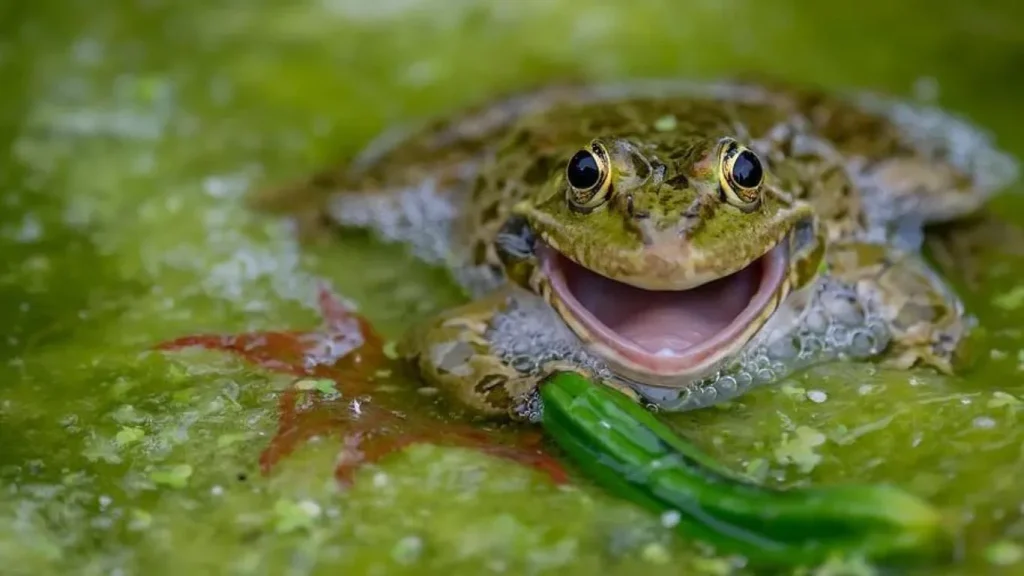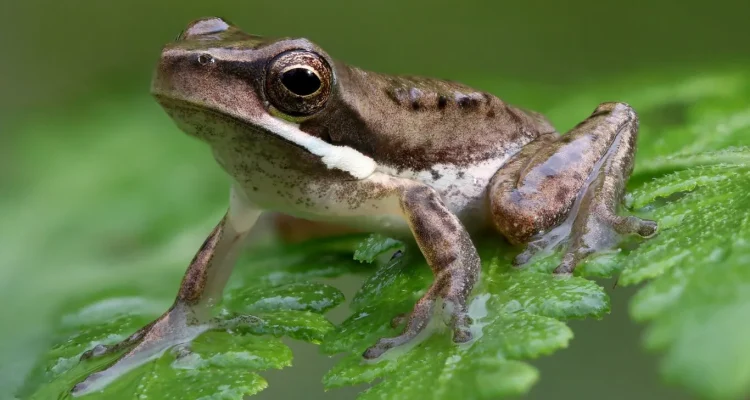Introduction
Have you ever wondered why frogs seem to steer clear of mint plants? It’s a curious phenomenon that many gardeners have noticed. Frogs, those tiny amphibians that hop around our gardens, have some intriguing preferences and aversions. Today, we’re diving into the mystery of why frogs do not like mint. We’ll explore their behavior, the role of scent, and the scientific reasons behind their aversion. Ready to unravel this green mystery? Let’s hop right in!

Understanding Frog Behavior
Frogs are fascinating creatures with unique behaviors and sensory perceptions. They rely heavily on their senses to navigate their environment, find food, and avoid predators. Among these senses, the sense of smell plays a crucial role in their daily lives.
Frog Sensory Perception
Frogs have a keen sense of smell, which they use to detect food, mates, and potential threats. Their olfactory system is well-developed, allowing them to pick up a wide range of scents in their environment.
Importance of Smell in Frog Behavior
The sense of smell helps frogs make critical decisions about where to live and what to eat. It also plays a role in avoiding danger, as certain scents can signal the presence of predators or other threats.
The Role of Smell in Frog Habitat Selection
Frogs are particular about where they live. They choose habitats that provide food, shelter, and safety from predators. Smell is a key factor in this selection process.
How Frogs Choose Their Habitats
Frogs use their sense of smell to find suitable habitats. They prefer environments that are damp and have plenty of insects to eat. They avoid areas with strong, unpleasant odors that might indicate danger or an unsuitable environment.
The Role of Scent in Avoiding Predators
Certain scents can signal danger to frogs. For example, the smell of a predator’s territory can make frogs steer clear. This is where mint comes into the picture.
Chemical Composition of Mint
Mint is a popular herb known for its refreshing scent and flavor. But what’s in mint that makes it so special?
What is Mint?
Mint refers to a group of plants in the Mentha genus, known for their aromatic leaves. Common varieties include peppermint and spearmint.
Key Chemical Components in Mint
Mint contains several chemicals, including menthol, menthone, and pulegone. These compounds are responsible for mint’s distinctive smell and flavor.
Frogs’ Reaction to Mint
Gardeners have long noticed that frogs tend to avoid mint plants. But is there any scientific basis for this observation?
Anecdotal Evidence from Gardeners
Many gardeners report that planting mint around their gardens helps keep frogs away. While anecdotal, these reports suggest a strong aversion among frogs to mint.
Scientific Studies on Frogs and Mint
Research on the subject is limited, but some studies indicate that certain chemicals in mint can be repellent to frogs. These studies help explain why frogs might avoid mint.
The Science Behind Frogs’ Aversion to Mint
To understand why frogs dislike mint, we need to look at the specific chemicals involved and how they affect frogs’ senses.
Specific Chemicals Frogs Find Repellent
Menthol and pulegone are two key chemicals in mint that frogs find particularly unpleasant. These compounds can interfere with frogs’ sensory receptors, making mint an undesirable plant.
How These Chemicals Affect Frogs’ Senses
When frogs come into contact with mint, the menthol and pulegone can cause irritation or discomfort. This reaction likely drives them to avoid areas where mint is present.
Comparative Analysis: Frogs and Other Animals
Frogs aren’t the only animals that react to mint. Let’s compare their reactions to other creatures.
Other Animals’ Reactions to Mint
Many animals, including insects and rodents, also find mint unpleasant. This makes mint a versatile plant for repelling various pests.
Similarities and Differences in Sensory Perceptions
While frogs and other animals share some sensory perceptions, there are differences in how they react to certain chemicals. Understanding these differences can help us better use plants like mint in pest control.
Practical Implications for Gardeners
For gardeners, knowing that frogs dislike mint can be quite useful. Here are some practical tips.
Using Mint to Deter Frogs
Planting mint around your garden can create a natural barrier that frogs are likely to avoid. This can help protect certain plants from being disturbed by frogs.
Other Natural Frog Repellents
In addition to mint, other plants like citronella and lavender can also deter frogs. Combining these plants can create a more effective repellent strategy.
Ecological Impact
While using mint as a repellent can be effective, it’s important to consider the broader ecological impact.
Potential Impact of Using Mint on Local Ecosystems
Introducing large amounts of mint into an ecosystem can have unintended consequences. Mint can be invasive, potentially outcompeting native plants.
Balancing Frog Repellent Use with Environmental Conservation
To balance frog repellent use with environmental conservation, it’s important to use mint strategically and in moderation. This helps protect both your garden and the local ecosystem.
Myths and Misconceptions
There are many myths about frogs and mint. Let’s clear up some common misconceptions.
Common Misconceptions About Frogs and Mint
One common myth is that mint is harmful to frogs. While they do avoid it, there’s no evidence that mint poses any direct harm to them.
Debunking Myths with Scientific Evidence
Scientific research helps debunk myths and provides a clearer understanding of the relationship between frogs and mint.
Alternatives to Using Mint
If mint isn’t suitable for your garden, there are other options.
Other Natural Frog Deterrents
Plants like marigolds and lemongrass can also help keep frogs away. These alternatives might work better in certain climates or garden setups.
Synthetic Frog Repellents
There are also synthetic repellents available that can effectively deter frogs without the need for specific plants. However, these should be used with caution to avoid environmental harm.
How to Grow and Use Mint in Your Garden
Mint is easy to grow and can be a valuable addition to your garden.
Growing Mint: Tips and Tricks
Mint grows best in well-drained soil with plenty of sunlight. It’s also a good idea to plant it in containers to prevent it from spreading too much.
Effective Ways to Use Mint as a Repellent
Place mint plants around the perimeter of your garden or near specific plants you want to protect. Regularly trim the mint to keep it healthy and effective.
Safety Concerns
While mint is generally safe, there are some considerations to keep in mind.
Is Mint Safe for Pets and Humans?
Mint is safe for humans and most pets. However, some pets might be sensitive to its strong scent.
Precautions When Using Mint in Gardens
When using mint in your garden, be mindful of its invasive nature. Regular maintenance is key to preventing it from taking over.
FAQs Why Do Frogs not Like Mint
Do frogs really dislike mint?
Frogs are known to avoid mint plants and their scent. This aversion is observed in many species of frogs.
What is it about mint that repels frogs?
Mint contains strong aromatic compounds like menthol and menthone. These chemicals can be irritating or overwhelming to frogs, affecting their behavior.
Does mint harm frogs?
Mint itself is not harmful to frogs in small quantities, but its strong scent can deter them from areas where it grows.
Are there any other plants that repel frogs?
Yes, frogs also tend to avoid plants with strong scents such as lavender, eucalyptus, and citronella.
Can mint be used as a natural frog repellent?
Yes, gardeners sometimes use mint plants to keep frogs away from specific areas like ponds or gardens where frogs may be unwanted.
Do all species of frogs dislike mint?
While many species show an aversion to mint, there can be variations among different types of frogs. Some may be more tolerant than others.
Is there a scientific reason behind frogs avoiding mint?
The exact reason for frogs avoiding mint hasn’t been extensively studied, but it’s believed to be related to the intense aroma of mint plants.
Can frogs be harmed by mint essential oils?
Yes, concentrated mint oils or extracts could potentially harm frogs if they are exposed to high doses. It’s best to avoid using strong concentrations of mint oils around frog habitats.
Conclusion
In conclusion, frogs’ aversion to mint can be attributed to the strong chemicals found in the plant, particularly menthol and pulegone. These chemicals affect frogs’ senses, leading them to avoid areas where mint is present. For gardeners, mint offers


Congratulation!